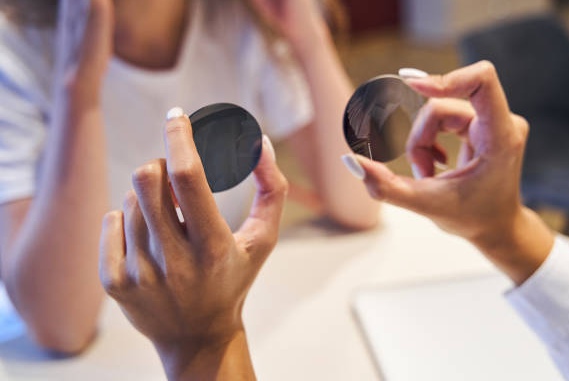
@ShahidNShah


The rapid advancements in medical technology (MedTech) have ushered in a new era for eye care, offering innovative solutions to improve the diagnosis and treatment of vision disorders. From cutting-edge diagnostic tools to advanced therapeutic devices, MedTech is shaping a future where individuals with visual impairments can enjoy greater independence and improved quality of life.
Modern diagnostic tools have significantly enhanced the early detection of vision disorders. Optical coherence tomography (OCT), a non-invasive imaging technology, provides high-resolution cross-sectional retina images, allowing clinicians to identify conditions such as macular degeneration, diabetic retinopathy and glaucoma at their earliest stages. The development of portable devices has further increased accessibility to comprehensive eye exams, enabling early intervention in underserved communities. These advancements are critical in preventing irreversible vision loss through timely and accurate diagnoses.
MedTech has transformed assistive devices for individuals with light sensitivity and other visual impairments. Specialized medical sunglasses equipped with UV and glare-reducing filters offer comfort and protection for those managing photophobia, cataracts or glaucoma. These low vision sunglasses for visually impaired individuals integrate advanced low vision filters designed to block short wavelengths, such as harmful blue light, while enhancing contrast. The inclusion of adaptive lens technologies further customizes the user experience, adjusting filtration levels based on ambient lighting conditions. The combination of reduced eye strain and improved clarity allows individuals to manage their daily tasks with greater efficiency and comfort.
Therapeutic devices are transforming vision rehabilitation for individuals with low vision caused by conditions like retinitis pigmentosa, which affects 1 in 3000–5000 individuals worldwide, and Leber’s hereditary optic neuropathy (the most common inherited mitochondrial disease) impacting at least 1 in 50,000. Tools such as electronic magnifiers and wearable technologies enhance visual input, enabling users to read, recognize faces and engage in detailed tasks with greater ease. Virtual reality-based training programs further improve rehabilitation, offering immersive environments simulating real-world scenarios. Combining advanced technology and portability, these devices reconnect visual impairment and functional independence, showcasing the potential of MedTech in vision care.
The integration of low vision glasses with advanced contrast-enhancing features represents a critical advancement in addressing vision disorders. These glasses assist individuals with conditions like macular degeneration or diabetic retinopathy by amplifying visual contrast and minimizing glare from bright environments. Medical sunglasses equipped with low vision filters and specialized coatings mitigate the impact of harsh lighting, enhancing indoor and outdoor visibility. Such innovations are particularly advantageous for individuals navigating high-glare conditions or working under artificial lighting for extended durations.
Artificial intelligence (AI) is revolutionizing eye care by supporting precision diagnostics and the development of personalized treatment plans. AI-driven algorithms analyze extensive datasets generated by imaging technologies, identifying patterns that may elude human observation. This capability improves the diagnosis of complex conditions, including early-stage glaucoma and retinal disorders. AI-powered virtual assistants are also emerging as valuable tools, providing real-time guidance for patients managing chronic eye conditions. Additionally, AI is central to adaptive assistive devices, which tailor their functionality to individual requirements, maximizing effectiveness and enhancing the user experience.
Blocking short wavelengths in the blue light spectrum has become an essential feature of medical sunglasses and other visual aids. Exposure to blue light, particularly from digital screens, can intensify eye strain and disrupt sleep cycles. Sunglasses for visually impaired individuals—featuring advanced low vision filters—address these challenges by filtering out harmful wavelengths. This approach reduces visual discomfort, sharpens contrast and heightens the overall visual experience, making it a critical innovation in contemporary eye care. Low vision glasses with similar blue-light filtering capabilities also provide additional benefits by improving focus and comfort for individuals engaged in prolonged screen use or other visually demanding tasks.
The continuous advancements in MedTech are redefining possibilities in eye care, presenting solutions to challenges once considered insurmountable. Innovations in diagnostic imaging, wearable technologies and specialized optical devices are creating a more inclusive environment for individuals with vision impairments. As research continues to expand the boundaries of innovation, the integration of MedTech into vision care promises a future where clarity and accessibility are achievable for all.

Artificial intelligence has finally found its place in modern healthcare and is changing how one detects, treats, and manages any particular medical condition. This is considered one of the most …
Posted Jan 15, 2025 Artificial Intelligence Healthcare
Connecting innovation decision makers to authoritative information, institutions, people and insights.
Medigy accurately delivers healthcare and technology information, news and insight from around the world.
Medigy surfaces the world's best crowdsourced health tech offerings with social interactions and peer reviews.
© 2025 Netspective Foundation, Inc. All Rights Reserved.
Built on Apr 25, 2025 at 12:44pm